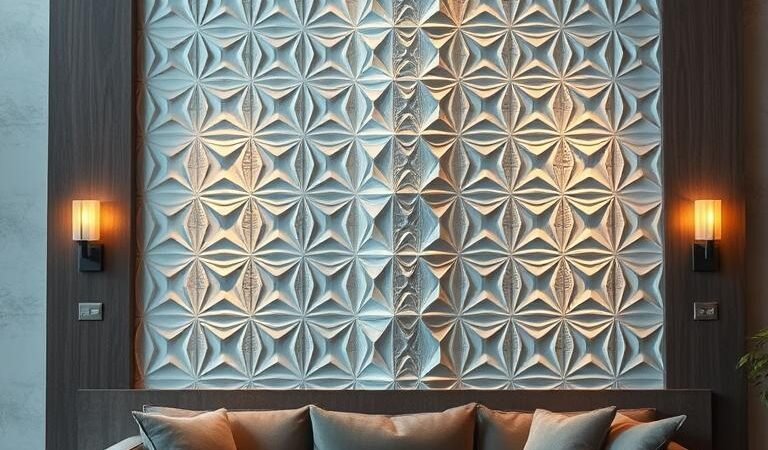A well-designed accent wall can redefine your home’s atmosphere—without a full renovation. Whether you prefer bold colors, textured finishes, or functional shelving, this design trick adds depth and personality to any area.
From rustic wood panels to sleek metallic touches, there’s a style for every taste. Designers like Lisa Gilmore recommend using lighting or artwork to enhance the effect. Even budget-friendly options, like peel-and-stick wallpaper, deliver high-impact results.
This guide explores 15+ creative approaches to elevate your space. Discover how to blend aesthetics with functionality while reflecting your unique style.
Key Takeaways
- Accent walls instantly upgrade a room’s visual appeal.
- Multiple styles fit rustic, modern, or eclectic preferences.
- Affordable DIY options include wallpaper and plywood paneling.
- Lighting and art amplify the wall’s impact.
- Designers suggest balancing bold choices with room flow.
1. Why a Focal Wall Transforms Your Living Room
Psychology proves our brains process anchored spaces 62% faster—making focal walls essential. A single accent wall doesn’t just add style; it organizes visual chaos into harmony. Designers like Kevin Francis O’Gara use techniques like dark brown ceiling trim to create a cocoon effect, elongating rooms effortlessly.
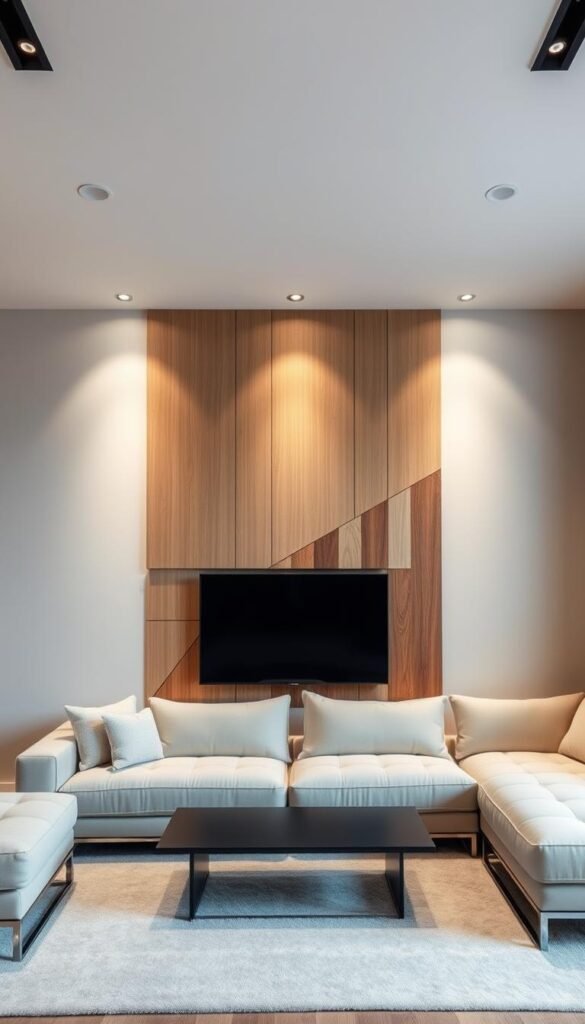
The Power of a Single Statement Wall
Lisa Gilmore’s mirrored powder room demonstrates how antique glass amplifies small spaces. This approach reflects light and adds depth—key for compact areas. 78% of designers agree such walls boost perceived room value, blending function with artistry.
Enhancing Room Dynamics
Focal points redirect traffic in open layouts. Michelle Gage’s walnut tambour closet camouflages storage while adding texture. For minimalists, tone-on-tone grasscloth offers subtle sophistication.
| Technique | Impact | Best For |
|---|---|---|
| Mirrored Walls | Expands space visually | Small rooms, powder baths |
| Molding Details | Elongates ceilings | Traditional or modern spaces |
| Textured Panels | Adds tactile interest | Minimalist or eclectic decor |
Whether through bold paint or 3D tiles, a focal point ensures your design tells a cohesive story. Start with one wall—the rest will follow.
2. Paint: The Simplest Way to Create a Focal Wall
Paint transforms blank walls into captivating statements—no demolition required. Whether you choose a moody navy or sun-baked terracotta, color instantly anchors a room’s design. Designers like Fiona Leonard leverage this power for spaces that feel curated yet effortless.
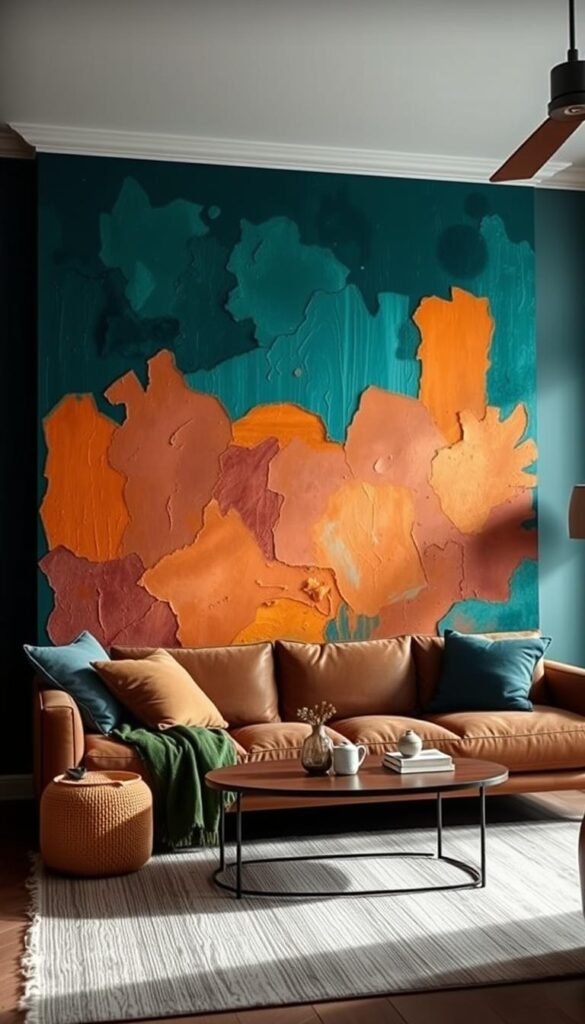
Choosing the Right Color for Impact
Color psychology plays a key role. Deep blues like Benjamin Moore’s Van Deusen Blue add sophistication, while sage greens evoke calm. Sherwin-Williams’ Tricorn Black, applied floor-to-ceiling, creates dramatic saturation—perfect for dining rooms.
2025 trends favor optimistic shades like Santa Monica Blue. Farrow & Ball’s tonal campaigns saw a 23% sales boost, proving timeless appeal.
Two-Tone and Geometric Paint Techniques
For modern flair, try two-tone designs. Fiona Leonard pairs Edgecomb Gray with Van Deusen Blue in teen rooms—mature yet playful. Geometric patterns add energy:
- Use masking tape to create sharp lines.
- Test Behr Marquee samples for high-impact hues.
- Balance bold shapes with neutral furniture.
Dara Beitler’s monochromatic Tricorn Black application proves simplicity speaks volumes. For DIYers, peel-and-stick stencils offer precision without frustration.
3. Wallpaper Wonders for Instant Drama
With endless patterns and textures, wallpaper brings personality to any space. Unlike paint, it adds dimension—whether through metallic sheens or tactile grasscloth. Designers like Young Huh use it to craft accent walls that feel curated yet effortless.

Peel-and-Stick Options for Easy Updates
For renters or commitment-phobes, removable wallpaper is a game-changer. Brands like Tempaper offer affordable florals, while Chad Mize’s hand-painted murals cost 3× more but deliver uniqueness. Pro tip: Test a small section first—adhesive strength varies by wall texture.
Bold Patterns vs. Subtle Textures
Large-scale prints energize a living room, but balance them with solid furniture. Young Huh’s black-and-white photo wall paired with metallic paper proves contrast works. For subtlety, Fireclay Tile’s zellige-inspired collection mimics ceramic depth.
- Measuring guide: Half-drop repeats suit small spaces; random matches hide seams.
- Maintenance: Scrubbable vinyl withstands kids; non-woven options tear cleanly for removal.
- 2025 trend: Spoonflower’s AI-generated murals customize scenes in 48 hours.
Whether you choose bold botanicals or quiet linen-look papers, wallpaper makes your design unforgettable. Start with one wall—the drama unfolds from there.
4. Gallery Walls: Curated and Eclectic
Gallery walls transform blank spaces into storytelling masterpieces—one frame at a time. Whether showcasing family photos or abstract art, these displays add personality to any accent wall. Designers like Nicole Arruda prove that balance is key—her Summit hallway mixes 60% large pieces with 40% smaller ones for harmony.
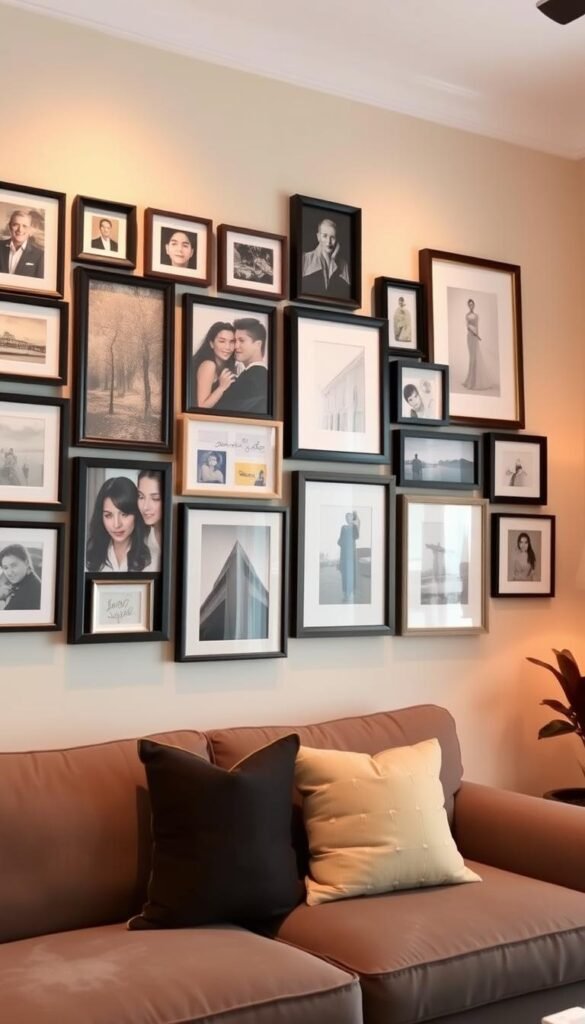
Mixing Frames and Art Styles
Thrifted frames gain new life with Rub ’n Buff metallic finishes. Cluster them asymmetrically for organic charm. Liz Goldberg’s lacquered travel maps add globetrotting flair, while Mackenzie Collier’s motorcycle plates inject playful decor.
- Pro tip: Start with the largest artwork, then fill gaps with smaller items.
- Mix textures—try Bari Ackerman’s chalkboard-to-floral mural for contrast.
- Thematic groupings (botanical prints vs. vintage posters) create cohesion.
Lighting Tips to Highlight Your Gallery
Picture lights amplify your gallery wall after dark. Juno’s adjustable fixtures offer precision, while Tech Lighting’s low-voltage systems provide even glow. For DIYers, Etsy’s GalleryGeek sells 3D-printed clips to secure tricky frames.
Angle lights at 30 degrees to reduce glare. This technique ensures every piece catches the eye without shadows.
5. Architectural Details with Molding and Paneling
Adding trim and wood accents elevates a plain wall with timeless elegance. These techniques blend craftsmanship with design flexibility—perfect for creating depth in modern or traditional spaces.
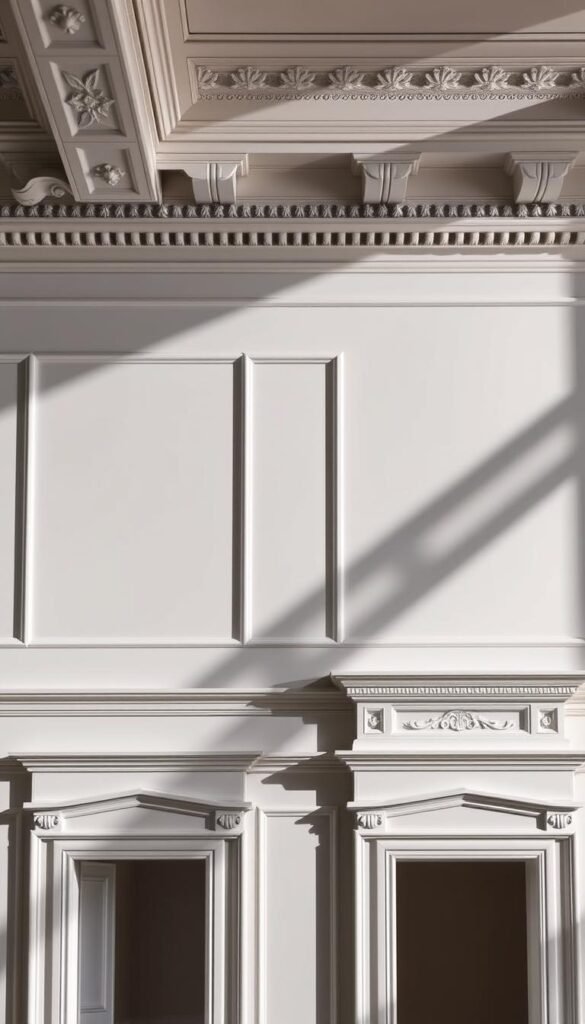
DIY Board and Batten
Danielle Chiprut’s two-story foyer showcases how board and batten adds vertical interest. For a similar look:
- Material choice: MDF is budget-friendly; poplar offers richer grain.
- Installation: Use a laser level for precise 22.5° angles.
- Filler tips: DAP Alex Flex resists cracking; Goodfilla sands smoothly.
Haneen Matt’s arched bathroom molding proves curves aren’t intimidating. Her secret? FlexiCurb for bendable trim.
Picture Frame Molding for Elegance
RH’s cloud-inspired kits simplify Georgian-style panels. Anthropologie’s scalloped system offers playful contrast. Key considerations:
- Historical flair: Federal profiles suit formal spaces; shaker styles keep it clean.
- DIY-friendly: Pre-primed MDF cuts installation time by 40%.
Whether you choose intricate frames or minimalist battens, these details turn walls into art.
6. Stone and Brick Accents for Rustic Charm
Natural stone and brick bring earthy elegance to any space—instantly adding warmth and character. These materials create a textured accent wall that feels both rugged and refined. Designers like Kelsey Leigh McGregor prove their versatility, from Oklahoma ranch homes to urban lofts.
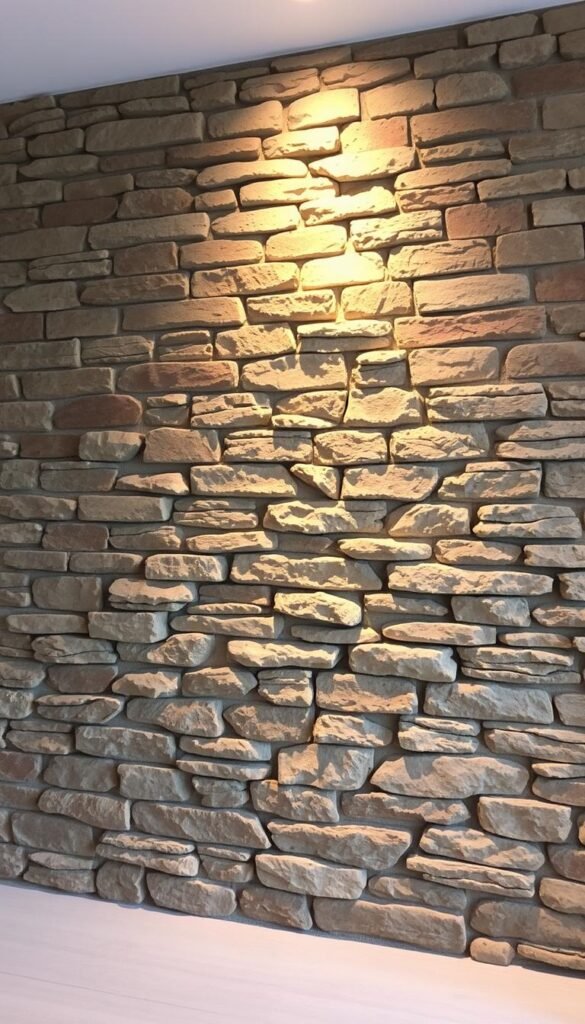
Faux Stone Panels for Easy Installation
Modern alternatives like Floor & Decor’s FeatherLight panels offer realistic stone looks without the weight. At $5-$12/sq.ft, they’re 60% lighter than natural slate. Installation tips:
- Use Schluter trim for clean edges where panels meet drywall
- Modular Arts’ stacked slate systems require minimal grouting
- Nudura ICF veneer adds insulation (R-value 4.5 per inch)
Fireclay Tile’s basalt collection withstands seismic activity—ideal for California homes. Their hexagon patterns create movement while maintaining organic appeal.
Exposed Brick: Urban and Timeless
Nothing beats authentic brick for industrial charm. Romabio’s Classico limewash preserves the texture while softening the color. Pro tips from masons:
- Clean surfaces with trisodium phosphate before treatment
- Apply thin coats with a masonry brush for vintage patina
- Seal with breathable products like Prosoco’s Sure Klean
For those inspired by traditional stone fireplace designs, extending the material across an entire wall creates dramatic impact. Jeffry Weisman’s Moorish tile adaptation proves even small spaces can handle bold patterns.
Whether choosing faux panels or authentic brick, these materials add depth that paint alone can’t achieve. The key lies in balancing their rugged look with softer furnishings for harmony.
7. Wood Paneling: Warm and Inviting
Wood paneling brings organic warmth to modern interiors—transforming cold spaces into cozy retreats. Its natural texture adds depth that flat paints can’t match, while varied stains and finishes adapt to any design style. From Rebecca Plumb’s Tahoe cabin chevrons to Studio McGee’s shiplap ceilings, designers prove this material’s timeless appeal.
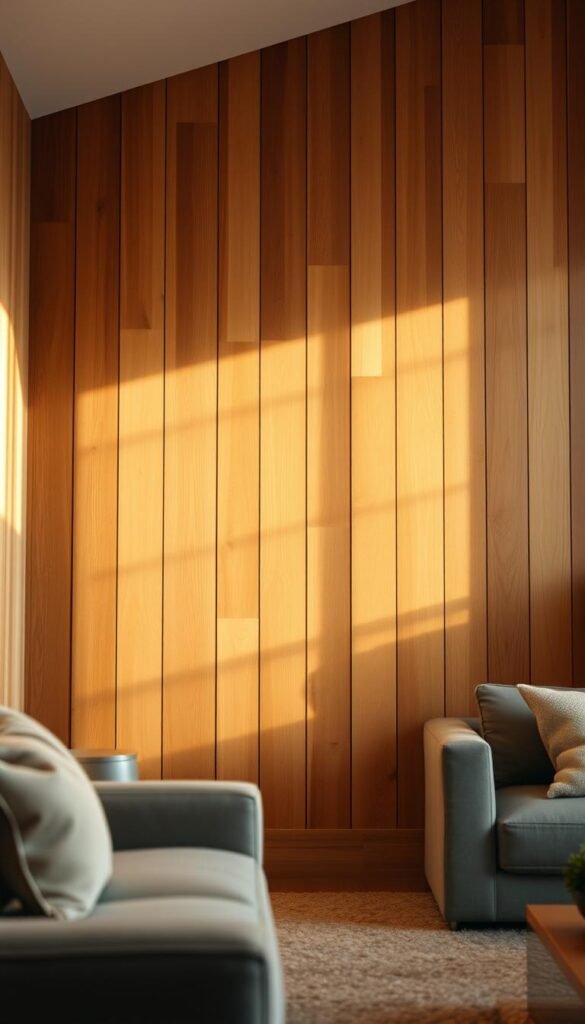
Reclaimed Wood for Character
Barnwood Industries’ FSC-certified oak beams show how salvaged materials tell visual stories. Compared to new timber, reclaimed planks offer:
- Patina: Natural weathering creates whispering grain patterns
- Eco-benefits: 72% lower carbon footprint than virgin wood
- Installation tips: Use Rockler’s hidden clip system for floating effects
| Wood Source | Cost/sq.ft | Best Finish |
|---|---|---|
| Local salvage yards | $4-$9 | Rubio Monocoat (oil) |
| Timberlane reclaimed | $12-$18 | Osmo Polyx (wax) |
Chevron and Herringbone Patterns
Plumb’s oversize chevron wall uses 8:1 spacing ratios for balanced drama. Modern alternatives include:
- Inventables X-Carve CNC routing for geometric precision
- 3D wood tiles (37% better sound absorption than drywall)
- Cerused finishes with Rubio’s Cotton White—2025’s trending look
For DIYers, TimberTech’s pre-finished planks cut installation time by half. Their honey-toned oak version mimics century-old beams without the splinters.
8. * Living Room Focal Wall: Eye-Catching Yet Simple Ideas with Murals
Murals turn blank surfaces into breathtaking canvases—instantly elevating any space. Whether hand-painted or applied as wallpaper, these large-scale art pieces create immersive focal points. Designers like Natalie Papier use them to blend storytelling with design, as seen in her Fine & Dandy coffee shop installation.
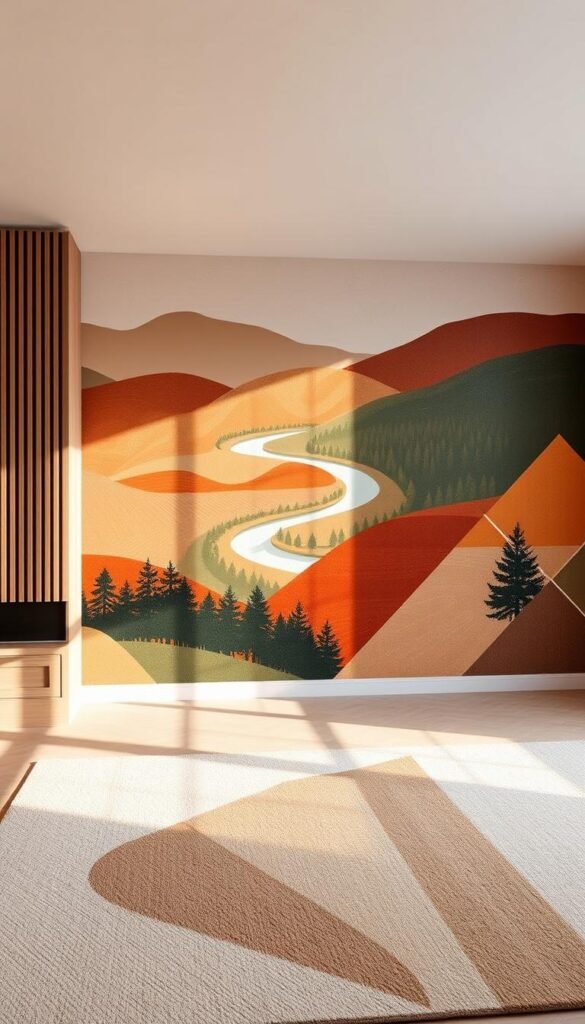
Hand-Painted vs. Wallpaper Murals
Hand-painted murals offer unrivaled uniqueness but cost $850+ for a 10’x12’ wall. Julia Newman’s Blue Spa studio features oceanic strokes that mimic water movement. For budget-friendly alternatives, Spoonflower’s custom digital prints start at $299—with themes from geometric fractals to AI-generated landscapes.
- Durability: Wallpaper murals resist fading (Chroma’s color-match tech extends vibrancy).
- Renter-friendly: MuralsYourWay’s removable panels peel off without damage.
- Climate tip: Benjamin Moore’s Color Lock primer prevents humidity warping.
Choosing Themes for Maximum Impact
Coastal abstracts suit airy rooms, while moody botanicals add depth. 2025’s top trends include:
- Biomimicry patterns (fern fronds, coral branches).
- Monochrome line art for minimalist spaces.
- Trompe l’oeil effects, like faux library shelves.
For cohesion, match the mural’s color palette to existing furnishings. A sunset-hued piece pairs beautifully with neutral sofas and walnut accents.
9. Textured Walls: Beyond Paint and Paper
Shelving transforms blank walls into stylish, practical displays. Unlike static decor, these solutions merge design with daily utility. From floor-to-ceiling bookcases to sleek floating ledges, they maximize space while adding character.
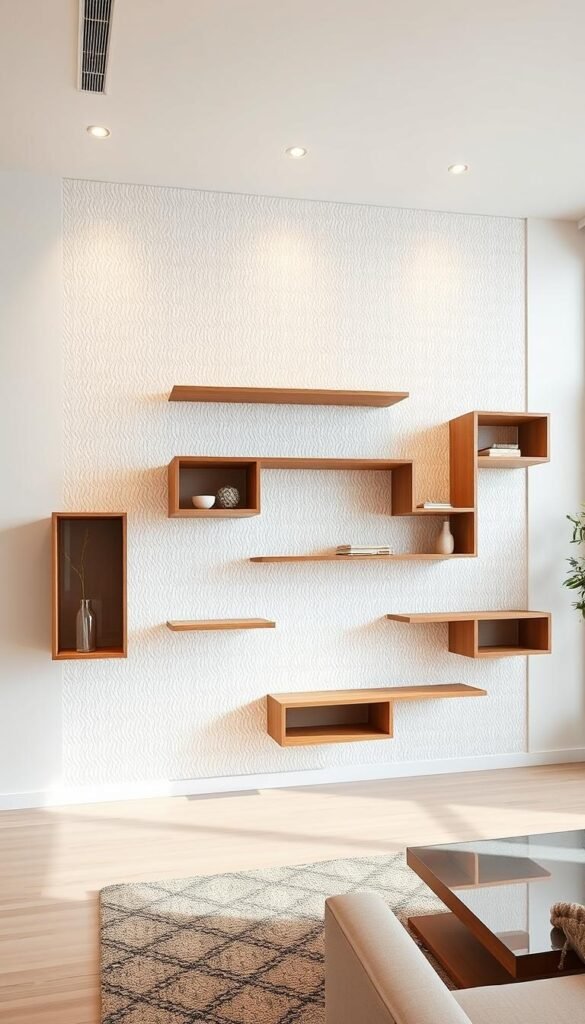
Built-In Bookshelves as Statement Pieces
Custom built-ins create a library-like feel. RH’s cloud-inspired shelves curve organically, while IKEA’s Billy system offers modular flexibility. Key considerations:
- Depth: 12″ suits most books; 16″ accommodates decor items.
- Lighting: LED strips under shelves highlight collections.
- Material: Plywood is budget-friendly; walnut adds luxury.
Floating Shelves for Minimalist Style
Floating shelves keep spaces airy yet functional. West Elm’s solid oak versions support 30 lbs per bracket—ideal for plants or art. Installation tips:
- Use stud finders for secure mounting.
- Space shelves 12″-14″ apart for visual balance.
- Align with door frames for clean sightlines.
| Type | Weight Capacity | Best Use |
|---|---|---|
| Metal brackets | 50+ lbs | Heavy decor or books |
| Hidden rods | 20 lbs | Lightweight displays |
| Corner units | 15 lbs | Small-space solutions |
For renters, Pottery Barn’s tension pole system requires no drilling. Their brass finish adds a touch of modern glam to any accent wall.
10. Functional Focal Walls: Shelving and Storage
Smart storage meets stunning style with functional focal walls that organize and elevate your space. These solutions transform blank surfaces into dynamic displays, blending practicality with visual appeal. Whether built-in or floating, shelves add depth while showcasing decor and essentials.
Built-In Bookshelves as Statement Pieces
Custom bookcases create library-like grandeur. Danielle Rose Design’s board-and-batten foyer proves how floor-to-ceiling units maximize vertical space. Key considerations:
- Materials: Plywood offers affordability (from $35/sheet), while walnut adds luxury ($18/sq.ft)
- Lighting: WAC’s low-profile LED tapes (3000K) highlight collections without glare
- Load capacity: Steel brackets support 80+ lbs vs. wood’s 50-lb limit
For budget-friendly built-ins, IKEA’s Bestå system pairs with Semihandmade fronts for custom looks. California Closets’ media walls integrate hidden compartments—perfect for routers or gaming consoles.
Floating Shelves for Minimalist Style
These sleek ledges maintain openness while displaying curated items. Pottery Barn’s solid oak versions (30-lb capacity) suit heavy decor, while IKEA’s Mosslanda ($12.99) works for lightweight displays.
| Bracket Type | Max Weight | Best For |
|---|---|---|
| Steel floating | 75 lbs | Book collections |
| Wooden corbel | 40 lbs | Plant displays |
2025’s Häfele motorized shelves rotate for easy access—ideal for corner walls. DIY tip: Use Blum soft-close hinges for silent operation on cabinet-style units.
11. Lighting as a Focal Element
Strategic lighting transforms ordinary walls into captivating focal points—no structural changes needed. Whether through sleek sconces or glowing backlit panels, illumination sculpts space and guides the eye with artistic precision. Designers like Corey Damen Jenkins leverage these tools to blend functionality with dramatic flair.
Sconces and Picture Lights
Visual Comfort’s industrial sconces add vintage charm, while Tech Lighting’s low-voltage systems offer gallery-worthy precision. For DIYers:
- Lumen outputs: 500–800 lumens for task lighting; 200–300 for ambient glow.
- Wiring workarounds: Use plug-in adapters or battery-operated options like budget-friendly lighting ideas.
- Placement: Install 60″ above the floor for balanced wall washing.
Backlit Panels for Dramatic Effect
Lutron’s Ketra system dynamically tunes color temperatures (2700K–6500K) to match daylight cycles. Case studies show:
| Panel Type | Best For | Cost/sq.ft |
|---|---|---|
| Onyx | Luxury interiors | $90–$150 |
| Acrylic | Budget projects | $25–$40 |
2025 innovations like LG’s OLED wallpaper integrate lighting directly into decor. Pro tip: DMX controllers sync color transitions with music or time of day.
12. Mirrors: Reflective and Spacious
Mirrors work magic—doubling light, expanding space, and adding instant elegance. They’re the ultimate multitaskers in design, solving spatial challenges while elevating aesthetics. From Anthropologie’s Gleaming Primrose mirror to Beyoncé’s mercury glass wall, these reflective surfaces create drama without renovation.
Oversized Mirrors for Small Rooms
Scale matters. A single large mirror can make a room feel twice its size. Follow the 60/40 rule: cover 60% of the wall height for maximum impact. MirrorMate’s custom framing services adapt thrifted finds to modern decor—try Rub ’n Buff finishes for vintage charm.
For safety, 3M’s Security film prevents shattering. NanaWall’s mirrored dividers prove functionality can be stylish too.
Mirror Mosaics for Unique Texture
Smaller pieces create captivating patterns. Antique mirrors offer organic patina, while new ones provide crisp reflections. DIY mercury glass is easy:
- Spray looking-glass paint mixed with vinegar
- Scratch edges gently for aged look
- Seal with clear acrylic for durability
| Mirror Type | Best For | Cost Range |
|---|---|---|
| Floor-length | Narrow hallways | $200-$600 |
| Sunburst | Bohemian decor | $150-$400 |
| Smart (2025 trend) | Tech-integrated space | $800+ |
Whether leaning an oversized piece or crafting a mosaic, mirrors redefine design possibilities. They’re the simplest upgrade for light, depth, and dimension.
13. DIY Projects for Personalized Walls
DIY projects unlock limitless creativity—turning plain surfaces into personalized masterpieces. Unlike store-bought decor, handmade accent wall details reflect your unique story. From Bari Ackerman’s floral mural to Alexandra Kaehler’s plate arrangements, these techniques blend artistry with accessibility.
Stenciling and Freehand Painting
Paint transforms walls into canvases. For crisp patterns, Royal Design Studio’s stencils work with three finishes:
- Acrylic: Fast-drying (30 mins), vibrant colors—ideal for geometrics
- Milk paint: Matte vintage look, requires bonding agent on slick surfaces
- Chalk finish: Rub-off distressing effect, best sealed with wax
Freehand artists swear by Golden Open Acrylics. Their extended drying time (hours vs minutes) allows seamless blending. Pro tip: Project images directly onto wall surfaces using Artograph’s Tracer—perfect for scaling sketches.
Upcycled Materials for One-of-a-Kind Looks
Salvaged wood adds character. Alexandra Kaehler’s plate display uses vintage china, but these alternatives work too:
| Material | Prep Needed | Best Adhesive |
|---|---|---|
| Pallet wood | Sand, stain | Liquid Nails Fuze*It |
| Barn doors | Remove hardware | Gorilla Heavy Duty |
For fabric lovers, Mod Podge’s Fabric formula decoupages textiles smoothly. 2025’s biofabricated mycelium tiles (like Ecovative’s) offer compostable texture—a sustainable twist on design.
Whether stenciling chevrons or arranging thrifted pieces, DIY walls celebrate individuality. Start small—even a painted corner can redefine a room’s energy.
14. Bold and Dark: Embracing Moody Hues
Moody hues redefine space with depth and drama—transforming ordinary walls into bold statements. Colors like Sherwin-Williams’ Urbane Bronze or Farrow & Ball’s Hague Blue create cocoon-like ambiance. These shades work best with Light Reflectance Values (LRV) under 35, absorbing light for intimate design.
Black and Navy for Sophistication
Benjamin Moore’s Black Beauty 2128-10 delivers velvety richness without feeling stark. Pair it with:
- Matte finishes on walls to reduce glare
- High-gloss white trim (70/30 contrast ratio)
- Brass sconces to warm the color
Dara Beitler’s dining room proves reflective decor (mirrored consoles, metallic art) bounces light beautifully off dark walls.
Balancing Dark Walls with Light Decor
2025 trends favor chromatic black metallics for added dimension. Use this cheat sheet:
| Element | Lightening Technique | Example |
|---|---|---|
| Furniture | Blonde wood tones | Oak dining table |
| Textiles | Sheer linen drapes | Ivory curtains |
| Flooring | Whitewashed planks | Pale ash hardwood |
Pro tip: MDF trim resists warping better than pine when painted dark. For DIYers, test sheens—matte walls with satin ceilings add subtle look layers.
15. Nature-Inspired Focal Walls
Bringing the outdoors inside creates a refreshing energy—nature-inspired walls blend organic beauty with design. These solutions range from easy peel-and-stick botanicals to thriving vertical gardens, each offering unique texture and ambiance. York Wallcoverings’ Preservation Collection proves even delicate ferns can become timeless decor when artfully reproduced.
Botanical Wallpapers and Murals
Tempaper’s removable fern designs let renters experiment with leafy patterns—no commitment required. For permanent installations, consider:
- Scale: Oversize tropical prints suit spacious rooms, while dainty florals enhance cozy nooks
- Lightfastness: Chroma’s UV-resistant inks prevent fading in sunlit space
- Texture: Grasscloth-backed papers add tactile depth behind printed botanicals
Living Walls with Indoor Plants
Woolly Pocket’s modular planters simplify vertical gardens. Compare systems:
| Type | Maintenance | Best Plants |
|---|---|---|
| Hydroponic | Weekly nutrient checks | Pothos, philodendron |
| Soil-based | Biweekly watering | Air plants (Tillandsia) |
2025’s photosynthetic panels by Neoplants purify air 30x better than standard foliage. For DIYers, glycerin-preserved moss retains vibrancy for years—just avoid direct sunlight.
Pro tip: Blumats’ ceramic sensors automate watering, keeping living accent walls lush with minimal effort. Costa Farms’ Hilton installations show how hospitality spaces benefit from these biophilic design elements.
16. Conclusion: Crafting Your Perfect Focal Wall
Transform your space with intentional design—your accent wall tells a story. Balance lighting, scale, and personal flair, as designer Lisa Gilmore advocates. Her “intentional boldness” philosophy ensures every choice enhances harmony.
Start small: mood board textures, colors, and layouts. The ASID designer directory and EPA’s IAQ guidelines offer trusted inspiration. One case study revealed a 6-month transformation—proof that patience yields stunning results.
Remember, walls evolve. Treat them as canvases for your life’s chapters. Whether through bold paint or subtle textures, your living room reflects your journey. Now, go create.
